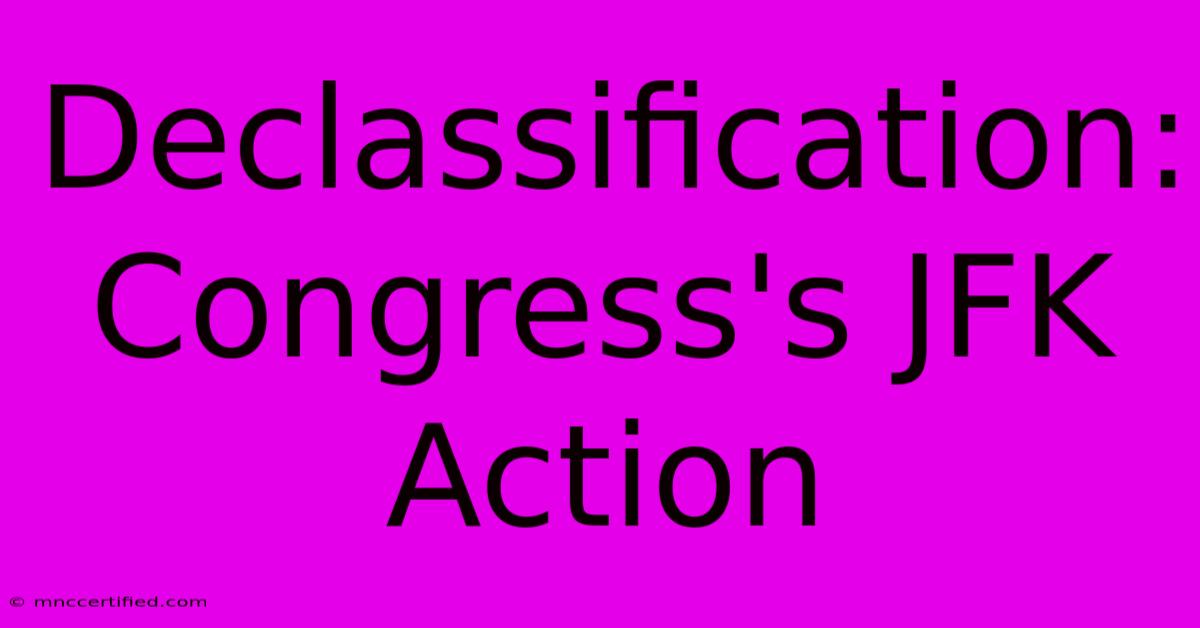Declassification: Congress's JFK Action

Table of Contents
Declassification: Congress's JFK Action – Unlocking the Secrets of Camelot?
The assassination of President John F. Kennedy remains one of the most enduring mysteries in American history. Decades later, the quest for truth continues, fueled by unanswered questions and conflicting accounts. Congress, recognizing the persistent public interest and the need for transparency, has played a crucial role in pushing for the declassification of documents related to the JFK assassination. But what exactly has Congress done, and what impact has it had on our understanding of this pivotal event? This article delves into the legislative actions taken by Congress to declassify JFK assassination records, analyzing their effectiveness and exploring the ongoing debate surrounding this sensitive issue.
The JFK Records Act of 1992: A Landmark Piece of Legislation
The foundation for the ongoing declassification efforts lies in the John F. Kennedy Assassination Records Collection Act of 1992. This landmark legislation mandated the release of all government records related to the assassination within 25 years, with limited exceptions for national security concerns. This act established a clear timeline and process for declassification, setting a precedent for future transparency initiatives.
The Act's Provisions and Challenges
The Act aimed to achieve a delicate balance: providing the public with access to information while protecting sensitive national security interests. However, the implementation of this balance proved challenging. The 25-year deadline spurred a flurry of activity as agencies scrambled to review millions of pages of documents. The process of reviewing and redacting sensitive information proved incredibly time-consuming and complex, leading to delays and ongoing debates about the scope of national security exemptions.
Congress's Continued Pressure: Beyond the 1992 Act
The 25-year deadline passed in 2017, but the declassification process was far from complete. Congress, recognizing the incomplete release of documents and persistent public demand, continued to exert pressure on the executive branch. Several legislative actions and hearings followed, underscoring the enduring interest in accessing the complete record.
The Presidential Review and Subsequent Extensions
Presidents have played a key role in the ongoing declassification process. While the initial deadline passed, presidents have issued executive orders extending the review process, citing national security concerns as the primary justification. These extensions have generated controversy, with critics arguing that they are unnecessarily delaying the release of potentially vital information. This ongoing tug-of-war between transparency and national security continues to shape the public narrative.
The Impact of Congressional Action: Progress and Limitations
Congress's actions, while significant, haven't resulted in the full transparency many hoped for. While numerous documents have been released, the process has been slow, incomplete, and often shrouded in secrecy. The effectiveness of Congressional oversight has been questioned, with critics citing a lack of rigorous scrutiny over the executive branch's declassification decisions.
The Ongoing Debate: Transparency vs. National Security
The core debate surrounding the declassification efforts boils down to the weighing of public transparency against the potential risks to national security. Proponents of full disclosure argue that the public has a right to know the truth about a pivotal moment in American history, regardless of potential security implications. Conversely, opponents claim that releasing certain information could compromise sensitive intelligence sources and methods, potentially endangering national security.
The Future of Declassification: What's Next?
The quest for full transparency regarding the JFK assassination continues. While Congress has played a crucial role in pushing for declassification, the process remains imperfect and incomplete. Future legislative actions and increased Congressional oversight may be necessary to ensure that the remaining classified documents are eventually released to the public. The continuing debate underlines the complex interplay between transparency, national security, and the enduring legacy of President Kennedy's assassination.
Keywords: JFK assassination, declassification, Congress, JFK Records Act of 1992, national security, transparency, government documents, John F. Kennedy, Camelot, presidential records, legislative action, public access, historical records, investigation.

Thank you for visiting our website wich cover about Declassification: Congress's JFK Action. We hope the information provided has been useful to you. Feel free to contact us if you have any questions or need further assistance. See you next time and dont miss to bookmark.
Featured Posts
-
Mc Cormick Wins Pennsylvania Senate Race
Nov 23, 2024
-
Gms F1 Entry Grid Expansion Imminent
Nov 23, 2024
-
Sporting Lisbon Amarante Team News And Lineups
Nov 23, 2024
-
Conor Mc Gregor Civil Trial Verdict
Nov 23, 2024
-
Bayern Munich Vs Augsburg Live Stream Guide
Nov 23, 2024